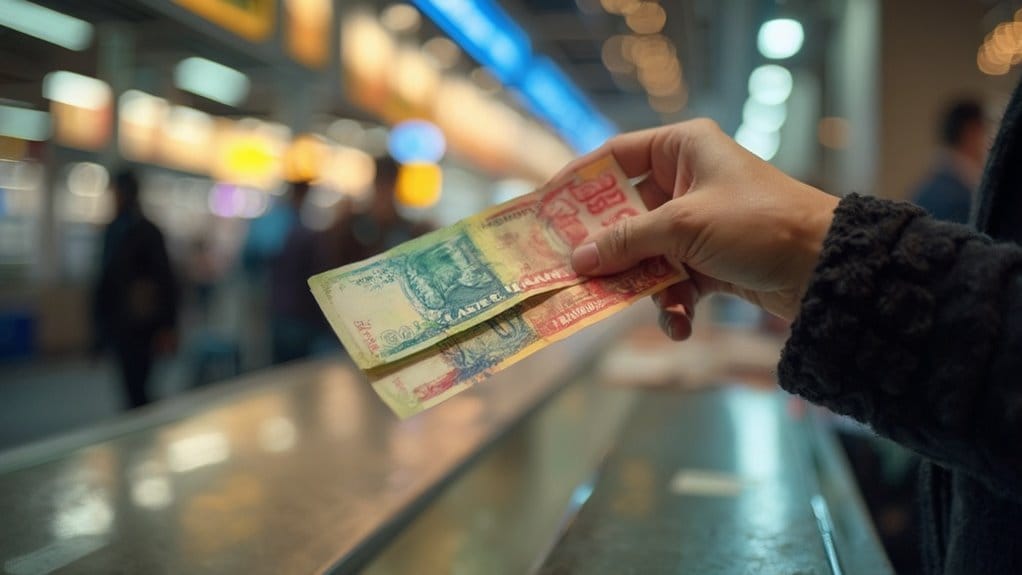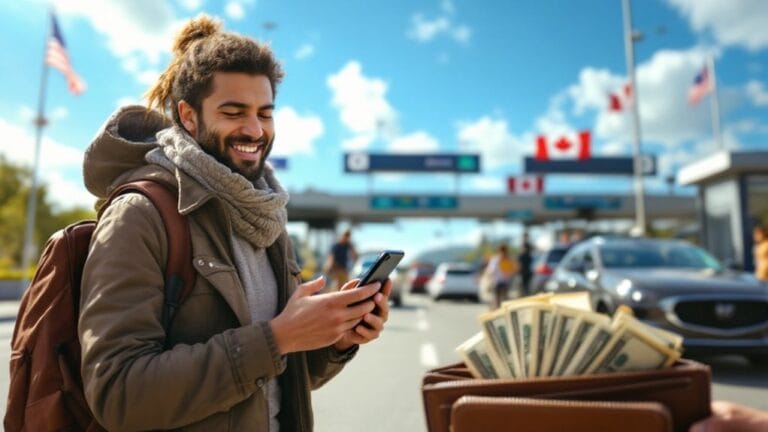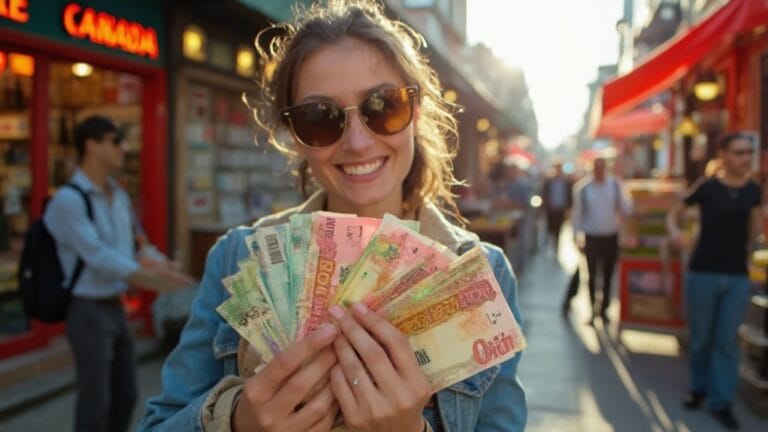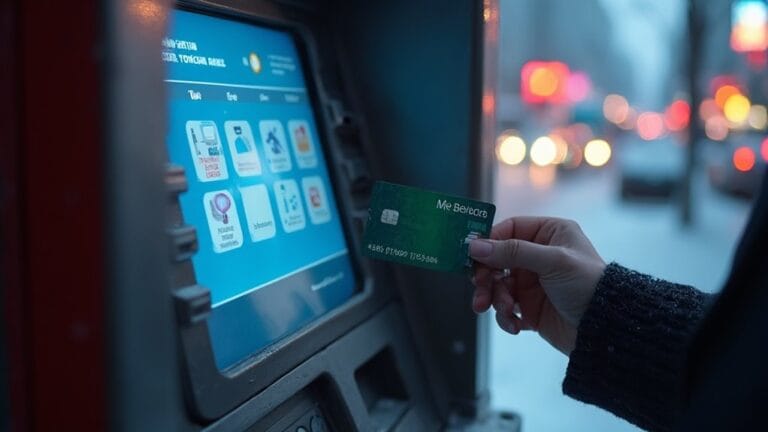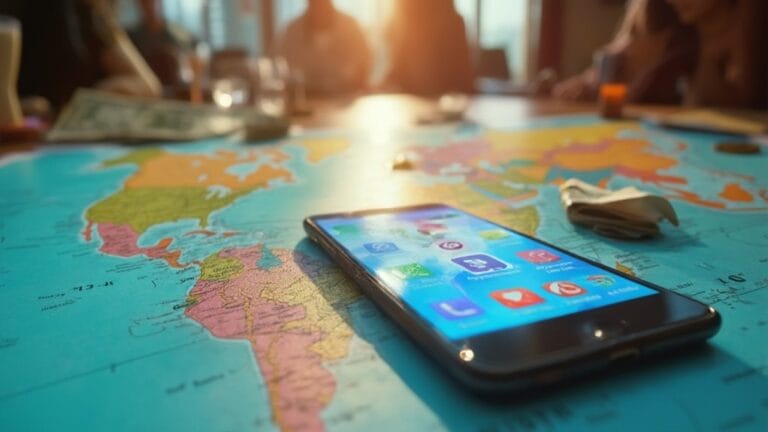Exchanging money before your Canada-US trip is a total game changer! Imagine this: you land, and instead of frantically hunting for an ATM or currency exchange, you already have cash ready for that delicious beaver tail or maybe a cheesy poutine. Plus, you usually snag better rates ahead of time, dodging those sneaky airport fees that could cost you a small fortune. Trust me, no one wants to lose ten bucks on a quick exchange! So, do yourself a favor and plan ahead—it makes budgeting for that epic road trip a breeze. Curious about more tips that'll save you cash?
Key Takeaways
- Pre-exchanging currency ensures you have cash on hand for immediate expenses upon arrival in the US.
- It often yields better exchange rates compared to airport exchanges, saving you money.
- Avoiding last-minute cash needs helps manage your travel budget more effectively.
- Pre-trip exchanges reduce the risk of incurring high fees typically associated with airport or hotel exchanges.
- Having local currency enables flexibility for small purchases in areas that may not accept credit cards.
Factors Influencing Exchange Rates
When planning a trip between Canada and the US, understanding the factors influencing exchange rates can save you money. You might think it's all about luck, but it's really about interest rates and inflation rates. Higher interest rates in a country can attract foreign investment, which tends to strengthen that currency. Imagine you're eyeing a cute souvenir in Canada—if interest rates are up, that little trinket might cost you less in US dollars!
Now, let's chat about inflation rates. Countries with lower inflation usually see their currencies appreciate. Think about it: if Canada's inflation is low, your US dollars will stretch further there. Who doesn't want more maple syrup for their money? Additionally, lower inflation rates can lead to higher currency values, which means your spending power increases while traveling.
Also, consider trade balances. If Canada exports more than it imports, its currency gets a boost. So, when you're checking exchange rates before your trip, keep an eye on these factors. They'll help you understand why one day you might get more for your dollar than the next. And hey, a little knowledge can make your travel budget go further, leaving you more cash for those delicious poutine fries!
Benefits of Pre-Trip Currency Exchange

Pre-trip currency exchange can transform your travel experience, offering both convenience and financial benefits. Imagine landing in a new country, tired and hungry, only to realize you need cash for a cab or snack. By exchanging money beforehand, you dodge that last-minute scramble and guarantee currency exchange security. Ordering from your local bank means you won't get stuck with those outrageous airport rates or high fees at hotels, which can feel like highway robbery!
You'll likely find better exchange rates by planning ahead, allowing you to stretch your budget further. Plus, with local currency in hand, you can set realistic travel budgeting strategies. Knowing how much things cost helps you avoid overspending on that fancy dinner or a souvenir you don't really need. Additionally, you can establish a USD bank account to easily manage your funds and take advantage of favorable exchange rates.
And let's not forget the flexibility! If you open a USD bank account, you can exchange currency at favorable rates. So, whether you're sipping coffee at a quaint café or exploring local markets, you'll be financially prepared. With a little planning, you can plunge into your adventure without worrying about money, making your trip all the more enjoyable. Happy travels!
Best Options for Exchanging Money

Finding the best options for exchanging money can make a significant difference in your travel experience. You've got a few choices, and knowing them can save you time and cash. First up, banks usually offer better exchange rates, and you can often order online currency or pick it up at a branch. Some, like PNC Bank, don't charge transaction fees, which is a win!
On the flip side, exchange desks at airports or hotels might look tempting for immediate cash, but be wary of their high fees and hidden charges. You don't want to get stuck with less favorable rates.
Then there are currency exchange services like Wise, which provide competitive rates and transparent fee structures. They're great for avoiding those sneaky hidden fees that can pop up unexpectedly.
Local currency exchanges can also be a good bet, often offering better rates than banks. Just make sure to do a little research to find a reputable service, especially in tourist areas. Additionally, it's wise to understand the exchange rate before converting money to ensure you're getting the best deal. With these options in mind, you're all set to exchange money like a pro, ensuring your Canada-US trip goes off without a hitch!
Practical Tips for Currency Exchange
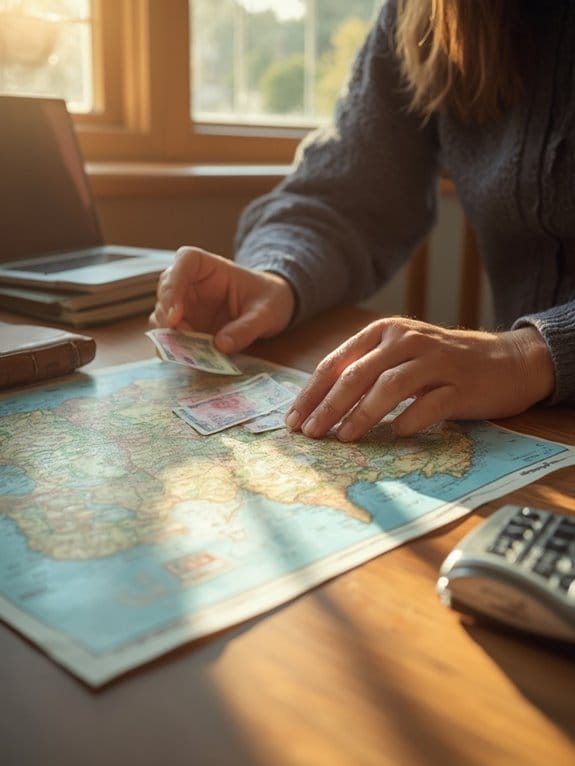
To guarantee a smooth currency exchange experience for your Canada-US trip, it's wise to prepare ahead of time. First off, getting cash in advance is a smart move. Swing by a bank to grab some US dollars before you leave Canada; this way, you'll dodge those pesky exchange fees. If you're planning to spend more time in the States, think about opening a US dollar bank account. It can help you score better rates when you exchange money or transfer funds.
Keep an eye on currency exchange methods, too. Research rates before you go—check out sites like the Bank of Canada and compare options between banks and local currency exchanges. While banks are usually reliable, they might not always give you the best bang for your buck. Airports are convenient but can be pricey, so use them only for immediate cash needs. Additionally, consider using local ATMs to access competitive exchange rates without high fees.
When using credit cards, save them for larger purchases to snag better rates, but don't forget to keep some cash handy for those little things, like snacks or tips. And remember to notify your bank before you travel; it'll help with travel money safety and keep your accounts from freezing unexpectedly!
Understanding Currency Fluctuations

Understanding currency fluctuations is key to managing your budget while traveling. Imagine you're planning a trip to the U.S., and suddenly, you notice the Canadian dollar is weaker. That's currency volatility at play! When the value drops, your purchasing power takes a hit, making everything from meals to hotel stays costlier. It's like finding out your favorite restaurant raised prices, but on a grand scale.
Economic factors, like inflation and interest rates, can swing currency values dramatically. A strong economy usually boosts your dollar, while high inflation? Not so much. Plus, market expectations can shift overnight, throwing your travel budget into disarray. It's a rollercoaster ride, and you've got to stay alert! Currently, the Canadian dollar has dropped to a four-year low, which can significantly impact your travel costs.
To navigate this, consider investment strategies like booking flights and accommodations in advance. Using credit cards for larger purchases can help, too. They often have better exchange rates than cash exchanges. Keeping an eye on current rates, especially those from trusted sources like the Bank of Canada, helps you dodge scams and excessive fees. So, next time you're gearing up for a trip, remember: understanding currency fluctuations can make all the difference in your travel experience!
Currency Exchange for Canada-US Travelers

When planning your trip to the U.S. from Canada, you'll want to think ahead about currency exchange. Sure, it might seem like a hassle, but trust me, it'll save you time and stress once you land. Imagine stepping off the plane and having cash ready for a quick taxi ride or a snack. That's the beauty of exchanging money before you travel!
Here are some currency exchange tips: First, hit up your bank for a stable rate and lower fees—much better than what you'll find at airports. Avoid those touristy spots; they're notorious for unfavorable rates. And hey, don't forget about post offices and border crossings—they can also help you out. ATMs provide the best exchange rates for obtaining cash abroad, making them a convenient option while traveling.
Having some cash on hand is smart, too. You never know when you'll need to pay for something and credit cards aren't accepted. Plus, you can stick to your travel budget by planning your exchanges wisely.
Lastly, consider online services like KnightsbridgeFX for competitive rates. Trust me, a bit of planning goes a long way, making your trip smoother and more enjoyable! Happy travels!
Frequently Asked Questions
How Much Cash Should I Carry for My Trip?
For your trip, you should carry about $50 to $100 daily in local currency. Prioritize cash safety and use budgeting tips to manage your expenses effectively, ensuring you have enough for emergencies and daily needs.
Can I Use My Debit Card in Canada?
You'll find that debit card usage is widely accepted in Canada. Most banks accept them, making purchases and withdrawals easy. Just watch out for foreign transaction fees, and you'll be good to go!
What Happens if I Run Out of Local Currency?
If you run out of local currency, consider emergency cash options like ATMs or using your credit card. Don't forget to check currency exchange tips beforehand to minimize fees and get better rates.
Are There Any Fees for Exchanging Currency at Banks?
When you exchange currency at banks, you'll often encounter bank service fees. These can vary widely, impacting your overall currency exchange rates, so it's smart to compare options before making a decision.
How Do I Avoid Being Charged Foreign Transaction Fees?
To avoid foreign transaction fees, explore credit card options with no fees and consider foreign transaction strategies like multi-currency accounts. Researching and comparing options can help you save money while traveling.

